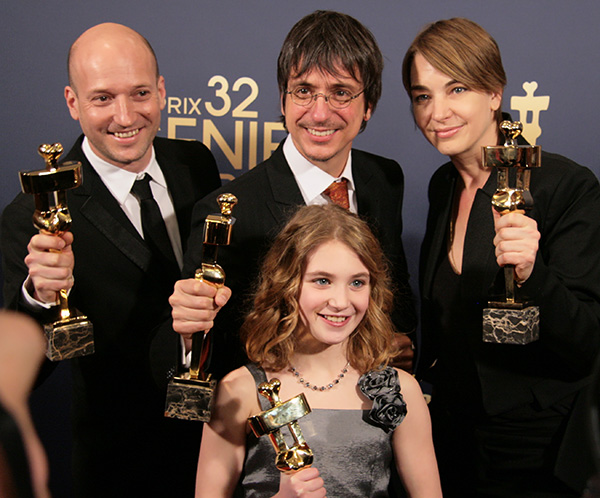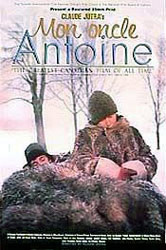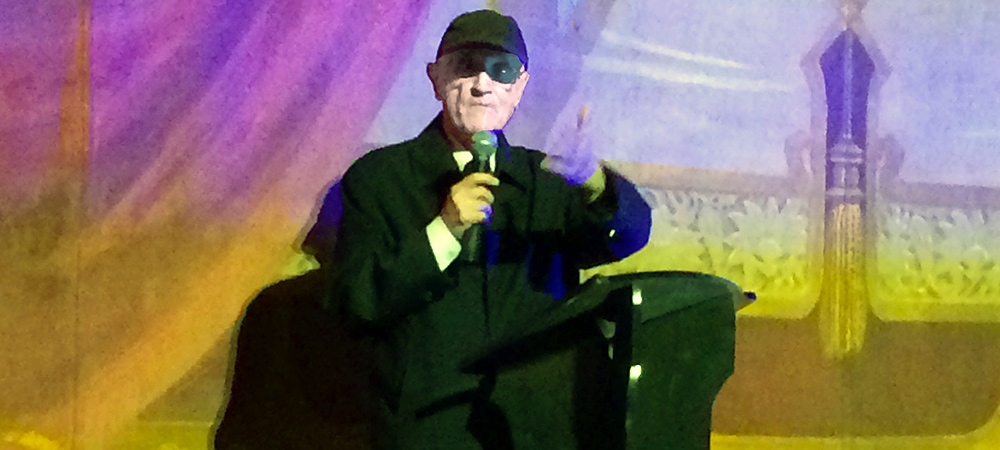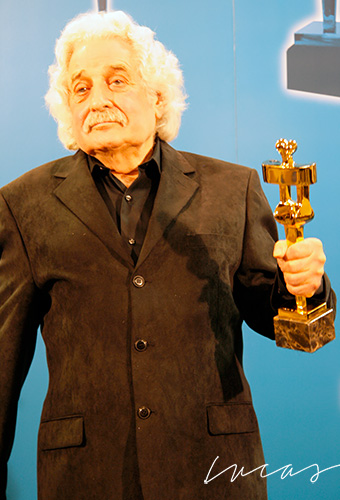A Decade Inside Québec
By Maurie Alioff
(January 6, 2020 – Montréal, QC) For the last ten years it was the best of times for Québec cinema. Success story followed success story from 2010 and into the new decade that just kicked in. I won’t be corny enough to say it has also been the worst of times, but for sure dark shadows sometimes loomed, and in the middle of the decade, the tightly knit film community got assaulted by the worst possible news.
In 2009, Xavier Dolan signalled a rising wave of Quebec filmmakers with his provocatively titled, quasi-autobiographical movie, I Killed My Mother. The then 19-year-old writer-director-producer-editor-costume designer, not to mention actor since childhood, followed up his attention grabbing debut with Heartbeats (2010). Back in 2012, I asked Dolan about his proclivity for style in his work, and in his personal appearance. “No style,” he said, “no taste. No taste, no judgement. No judgement, no brain.”
Dolan’s prolific, often gay-themed output continued with Laurence Anyways (2012), Tom at the Farm (2013), the explosively brilliant Mommy (2014), and It’s Only the End of the World (2016). During a round table interview session at TIFF 2014, he offered an insight into his inspiration: “Working with actors, and working as an actor is the sheer joy of this business for me, the sheer pleasure of understanding acting, of fine-tuning it, of exploring a variety of acting styles, and more and more the feasibility of working with great actors who I’ve admired. I have childhood heroes with whom I would love to work, and more and more, I feel that I may be getting closer to them.”
For Dolan’s next project, The Death and Life of John F. Donovan, he got close and worked with a dream cast that included Natalie Portman, Susan Sarandon, Thandie Newton, Kathy Bates, and Kit Harington. Over the next two years, the industry yammered away about how Dolan’s first English-language movie had bogged down in endless post-production. After years of screening his projects at Cannes, Dolan withdrew Death and Life from the 2018 festival and premiered it at the 2018 Toronto International Film Festival. Reviews and box office for the film’s limited release were more than disappointing.
By the end of the decade, Dolan was talking about restraining his flamboyant moviemaking. At the end of 2019, he released the intimate comedy-drama Mathias et Maxime, which has been received warmly, but without the excitement triggered by previous pictures.
Other thriving Quebec filmmakers managed to finesse English-language productions with a success that has so far eluded Dolan. Following the release of his last mainly French-language film, Café de Flore (2011), Jean-Marc Vallée drew admiring attention with his Oscar-winning Dallas Buyers Club (2013), Wild (2014), and Demolition (2015). He has worked with Matthew McConaughey, Nicole Kidman, Laura Dern, Meryl Streep, and Amy Adams on multiple award-winning shows.
Wild was produced by and starred Reese Witherspoon, with whom Vallée launched a working relationship on the hit series Big Little Lies (2017-). “I feel safe with Jean-Marc,” Witherspoon told Variety, “more safe than I’ve ever felt with anybody, because he’s my brother, he’s my partner … We don’t have any artifice between us.” Working with a different team, Vallée directed the hit Sharp Objects (2018), another series that delves into shadowy areas. Vallée says he loves filmed stories that allow him to narrate “as if they are fables.”
Another writer-director, Philippe Falardeau, picked up awards, strong box office, and international admiration for Monsieur Lazhar (2011), a touching story about an immigrant teacher. The films that followed, inside and outside Quebec, did not achieve the overseas status of work by Dolan, Vallée, or Denis Villeneuve, but they are solid projects reflecting Falardeau’s love for intimate stories and his fascination with varied cultures.
The Good Lie (2014), set in the Sudan, features Reese Witherspoon; My Internship in Canada (2015) is a political satire about culture clash; and Chuck (2016) tells the real-life story of the failed boxer who inspired Sylvester Stallone’s Rocky character and stars Liev Schreiber, Elizabeth Moss, and Naomi Watts. As the Twenties begin, Falardeau is in post-production on My Salinger Year, which probes the life of legendary writer, J.D. Salinger.
The most spectacular rise of a Quebec filmmaker has been Denis Villeneuve’s; the Hollywood Critics Association just named him the filmmaker of the decade.
Villeneuve was already accomplished and highly respected in 2010 when Incendies, his powerful film about a family caught up in Middle-Eastern chaos, picked up an Oscar nomination for Best Foreign-Language film, 9 Prix Jutra and 8 Genie wins, as well as a strong return at the Canadian box office. Hollywood called, and Villeneuve went on to one taut, muscular exploration of human darkness after another: Prisoners (2013), Enemy (2013), Sicario (2015), and Blade Runner 2049 (2017).
For a sci-fi movie lover since his teenage years, Blade Runner 2049 was Villeneuve’s dream project, one that achieves moments of visionary strangeness. Arrival (2016) plays as more gentle sci-fi from a moviemaker currently trying to pull off an adaptation that his hero David Lynch screwed up. In post-production on Frank Herbert’s Dune, Villeneuve is also prepping another cherished venture, Cleopatra.
Movies are “like dreams,” Villeneuve told me during an interview. “When you dream, that’s a way for the subconscious to get rid of dark matter. My movies all have in common that I’m trying to dig into my fears. Deep fears. And the fear of violence is very alive. I’m trying to feel the impact of violence, trying to explore it. It’s so present in our world.”
Other decade highlights included Kim Nguyen’s Rebelle (War Witch), a searing film about a child soldier that was nominated for a Best Foreign Film Oscar in 2012; Sébastien Pilote’s deeply touching Le Vendeur (2011); and Robin Aubert’s zombie extravaganza The Hungry (2017).
Riding the latest wave, women filmmakers came up with a varied slate of movies. Chloe Robichaud’s sensitive take on girlhood Sarah Prefers to Run (2013); Anne Émond’s beautiful and tragic Nelly (2016); Monia Chokri’s madcap My Brother’s Wife (2019); Sophie Deraspe’s ingenious Antigone (2019); and Louise Archambault’s heartfelt And the Birds Rained Down (2019).
While times have changed, productions by men still outnumber women’s work. Meanwhile, disturbingly rare in Quebec and TROC (The Rest of Canada), Jephté Bastien’s Sortie 67 (Exit 67) was an uncompromising, striking movie about black characters. Released in 2010, the film depicted Haitian gang bangers in Montreal’s St. Michel District. At the premiere, an ex-gangster told me that the movie made him cry. “That was my life on the screen.”
Loaded with style, substance, and seductive cool, the picture aspired to be a barrier-breaker, “an entry point,” as Haitian-born Bastien said. It won the Claude Jutra Award for best feature by a first-time film director at the 31st Genie Awards.
Ironically, despite the success of filmmakers inside and outside Quebec, the domestic film business took a hit. In 2009, local movies commanded 13% of the market, and in previous years, box office was even healthier. In 2010 the numbers fell to 9%. In 2009, the madcap comedy De père en flic (Fathers and Guns) earned $10 million; the biggest hit of 2010 was the air crash story, Piché entre ciel et terre, which barely made it to $3.5 million.
Pictures that were geared for commercial success failed to bring in big bucks. The escalating success of high-profile American shows gave the local industry the heebie-jeebies; maybe Quebecers were getting bored with local product. In fact, by the end of the decade, films like Ken Scott’s comedy Starbuck (2011), re-made in the U.S. as Delivery Man (2013), did respectable business without attaining the heights they reached back in the day.

Despite the downturn, top producers Luc Déry and Kim McCraw of micro_scope, which made Villeneuve’s Incendies and Enemy, Falardeau’s Monsieur Lazhar and My Internship in Canada, have consolidated as one of the country’s most fine-tuned production operations. Their company is about to release Falardeau’s My Salinger Year.
Playing a different kind of game, Oscar winning (for Denys Arcand’s The Barbarian Invasions) Denise Robert and Daniel Louis have been on track throughout the decade. The team specializes in hit comedies like Menteur (2019) and De père en flic 2 (2017). Their company Cinémaginaire produced The Fall of the American Empire (2018) and other films by Robert’s husband, Denys Arcand.

In 2016, the Quebec film scene was shattered by terrible news. For years, the late Claude Jutra’s Mon Oncle Antoine (1971) was routinely named the best Canadian film ever made. Then suddenly, the brilliant director-writer, beloved inside and outside the industry, mourned since his tragic death in 1986, was credibly alleged to be a sexual predator and pedophile who systematically assaulted a six-year-old boy into his adolescence.
The credibility of the charges led Quebec officials to eliminate Jutra’s name from eight streets and parks. And 2017 was the second year that Quebec’s annual film awards were no longer named after the filmmaker. The award is now called the Prix Iris, and except for a few of Jutra’s closest friends, who fear there might have been a rush to judgment, no-one says very much about him anymore. I have memories of casual encounters with a guy who was warm and friendly. It’s shocking to contemplate that over many years, this genial and talented man poisoned a young boy’s life.
The decade began relatively well for founder and president of the Montreal World Film Festival, city legend Serge Losique. In 2010, one of his fiercest critics, Le Devoir’s Odile Tremblay wrote that the beleaguered fest seemed to be getting back on the rails.
Talented filmmaker Louis Belanger, whose Route 132 opened the 2010 edition, told media, “This festival has been a very good launching pad for my films.” Denis Villeneuve agreed that the MWFF worked for Quebec releases, but he told the Journal de Montreal, “The truth is that the World Film Festival no longer exists on the world stage.”

As was his wont, the pugilistic Losique shot out a press release proclaiming, “The Montreal World Film Festival leads all prominent Quebec festivals in international media coverage.” Then over the years, various problems, including lawsuits, tax issues, and overall financial crises plagued the event.
I programmed for the fest in 2016 and 2018 when thousands of inquiries and submissions poured into the festival office on Bleury street. Contrary to popular myths, some excellent movies screened. But apart from the festival’s gracious Imperial Theatre, Losique found it harder and harder to book venues, scheduling got chaotic, and audiences dwindled. Finally, in the summer 2019, Losique announced he was cancelling the 43rd edition, claiming he wanted to prepare for 2020.
Meanwhile, in 2010, the FanTasia International Film Festival opened the decade in the aftermath of a breakthrough moment. The previous year, the fest enjoyed a Quentin Tarantino-approved screening of his Inglourious Basterds. Telefilm Canada exec Sheila De La Varende showed up at the opening of the 2010 event and addressed the typically excited Fantasia fans. It was a confirmation that the fest was finally benefitting from official recognition, and it hasn’t looked back since.
FanTasia screenings are more popular than ever, and it hosts various events, including Frontières, a forum for genre picture professionals. Likewise, the Festival du Nouveau cinéma (FNC), despite some turbulence a couple of years ago, has kept a steady course, drawing in its loyal fans with an intelligently curated program split into various sections, among them competitions.

In July, 2018, the Montreal film scene lost one of its most beloved characters, the curly-haired, impishly witty Harry Gulkin. Gulkin was one of Canada’s first indie producers (1975’s Lies My Father Told Me, 1978’s Jacob Two-Two Meets the Hooded Fang, a Mordechai Richler children’s story, 1978’s Two Solitudes) who went on to become a project manager at SODEC (Société de développement des entreprises culturelles du Québec). Moviemakers Gulkin worked with all say he was helpful and inspiring. Late in his life, Gulkin and moviemaker-actress Sarah Polley revealed that he was her birth father. The revelation led to Polley’s innovative and award-winning doc, Stories We Tell.
In May, a few months before Gulkin’s death, his friend, producer Kevin Tierney died prematurely. I had a once-in-a-while smoked meat lunch ritual with Kevin, and we had the final get-together with Harry at Lester’s Deli in Outremont. It was a warm summer’s day on the terrace, and like all Montrealers we discussed Lester’s sandwiches compared to Schwartz’s, the Main’s, and the Snowdon Deli’s.
Conversational sparks flew, sarcasm reigned. Kevin was always irreverent and funny, known best as the producer of Bon Cop, Bad Cop, which he co-wrote, the highest-grossing Canadian film at the time and winner of the 2006 Genie Award for Best Picture.
After a long career as a teacher, publicist, and producer for Montreal’s Rock Demers’ company, Tierney struck out on his own and his own Park Ex Pictures. He was a welcome sight on panels at industry events, and key festivals, an enthusiastic supporter of Canadian filmmaking, working for institutions like the Cinémathèque québécoise. Tierney produced films written and directed by his son Jacob. His daughter Brigid is an actress.
Thinking about Harry and Kevin as I write this, I realize how much I miss them. Another loss to Quebec’s film world is venerable actress Andrée Lachapelle who died recently after returning to the screen at the age of 88 in Louise Archambault’s And the Birds Rained Down, which will stand as one of the best movies of the decade.
![]() Maurie Alioff is a film journalist, critic, screenwriter and media columnist. He has written for radio and television and taught screenwriting at Montreal’s Vanier College. A former editor for Cinema Canada and Take One, as well as other magazines, he is affiliated with the Quebec media industry publication, CTVM.Info. His articles have appeared in various publications, including Canadian Cinematographer, POV Magazine, and The New York Times.
Maurie Alioff is a film journalist, critic, screenwriter and media columnist. He has written for radio and television and taught screenwriting at Montreal’s Vanier College. A former editor for Cinema Canada and Take One, as well as other magazines, he is affiliated with the Quebec media industry publication, CTVM.Info. His articles have appeared in various publications, including Canadian Cinematographer, POV Magazine, and The New York Times.


